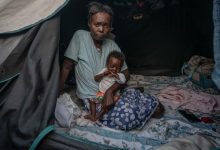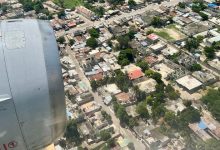Peace Talks Pave the Way in Colombia’s Quest for Peace
 Colombia has reached an “important juncture” in advancing peace after decades of war, but efforts to sustain the current momentum must be redoubled, the head of a UN mission in the country told the Security Council on Tuesday.
Colombia has reached an “important juncture” in advancing peace after decades of war, but efforts to sustain the current momentum must be redoubled, the head of a UN mission in the country told the Security Council on Tuesday.
“However difficult and demanding of patience, Colombia’s decision to prioritise dialogue as a principal means to resolve conflict sets the country apart as a model that is more relevant than ever in today’s world,” said Carlos Ruiz Massieu, the UN Secretary-General’s Special Representative and head of the UN Verification Mission in Colombia.
Emerging from decades of war, the Government has since made critical strides in implementing the 2016 Final Peace Agreement by advancing ongoing dialogue initiatives, he said, recalling the Council’s recent visit when members were able to observe firsthand the “deep desire for peace”, from the highest levels of government and state institutions through civil society and vulnerable communities in the regions still afflicted by conflict.

UN Photo/Eskinder Debebe
Carlos Ruiz Massieu, Special Representative of the Secretary-General and head of the UN Verification Mission in Colombia (UNVMC), briefs members of the Security Council.
‘Still a long way to go’
“The key challenge for transforming that aspiration into reality is to channel the abundant political will and the drive of civil society into ever more tangible dividends of peace on the ground,” he said.
Eleven former combatants have been killed since the Secretary-General’s last report, and social leaders and entire communities still suffer the full impact of ongoing violence and the limited presence of State institutions in various regions, he said, adding that there is “still a long way to go” to meet the peace agreements ambitious goals.
Recommending better use of existing tools to implement the peace agreement, he called on the government to finalise legal instruments and reintegration programmes for former combatants to provide these men and women with certainty and consolidate their transition to civilian life.
Anticipating ‘concrete results’
However, the Secretary-General’s latest report recognises significant increases in budget allocations and efforts of the current government, he continued.
As such, he anticipated “concrete results”, including on the agreement’s provisions that seek to address the longstanding exclusion and disproportionate impact of the conflict on women, indigenous and Afro-Colombian communities and lesbian, gay, bisexual, transgender and queer (LGBTQ) persons and the soon-to-be-launched national action plan for implementing Security Council resolution 1325 – on women, peace and security.
“I trust that this Council will echo our calls to encourage all actors in Colombia to redouble their efforts to implement the 2016 Peace Agreement and to pursue dialogue as a way to further consolidate peace in the country,” he said.

PAHO/Karen González Abril
Efforts are ongoing to reach communities around Colombia with health and education programmes.
‘Scarred by war, yet hopeful for peace’
Marcela Sánchez, Executive Director of the non-governmental organisation Colombia Diversa, briefed the Council on the conflict’s impact on LGBTQ people and what remains to be done to ensure an inclusive peace.
“Thanks to our collective efforts, what was once unthinkable is now possible: peace initiatives that recognise all Colombians, slow but meaningful social change towards a world without discrimination and a legal framework rooted in the fundamental principle of equality,” she said. “I come from a country scarred by war, yet hopeful for peace.”
However, challenges persist, she said, as LGBTQ people have long been targeted for who they are due to entrenched patriarchal norms and discrimination, and Colombia remains “one of the deadliest countries in the world for human rights defenders”.
“Every attack against an LGBTQ person, every human rights defender killed and every murder left uninvestigated sends the message that our lives are dispensable,” she warned, pointing to reports of at least 6,000 crimes committed against them during the armed conflict and at least eight deaths against rights workers in 2023.

Sinergias/Wilber Caballero
Preparations ahead of meetings in an indigenous community in Colombia.
‘Think of Colombia as a laboratory’
For a lasting peace, LGBTQ people must be involved in every stage of peacebuilding, she stressed, offering suggestions how the Security Council can recommend this process around the world, including by demanding the full participation of women and LGBTQ people in implementing Colombia’s peace agreement and calling for an end to all targeted intimidation and attacks and for perpetrators to be held accountable.
“Think of Colombia as a laboratory for implementing the principles of equality, non-discrimination and inclusivity that are so central to the women, peace and security agenda,” she said. “Success or failure here could set an important precedent for the protection of LGBTQ rights elsewhere in the world. We hope this Council seizes the opportunity to lead by example.”
She said she hoped “that the Security Council can send a powerful signal to the LGBTQ population in Colombia that their lives matter and that you will stand by your commitment to protect their rights”.
Garrett is a skilled author driven by a desire to illuminate global issues through his writing. With a foundation in journalism and international relations, he offers a distinctive viewpoint in his work, exploring the complexities of geopolitical events in depth.




“However difficult and demanding of patience, Colombia’s decision to prioritize dialogue as a principal means to resolve conflict sets the country apart as a model that is more relevant than ever in today’s world,” said Carlos Ruiz Massieu, the UN Secretary-General’s Special Representative and head of the UN Verification Mission in Colombia.
Colombia’s commitment to prioritizing dialogue as a means to resolve conflicts is truly commendable. The progress made in the peacebuilding efforts is inspiring and serves as a shining example for other countries facing similar challenges. The collective determination to pursue peace should be celebrated and supported at all levels.
What specific actions are being taken to ensure the sustained momentum for peace in Colombia?
To maintain the momentum for peace in Colombia, various initiatives are being implemented, including ongoing dialogue programs, efforts to implement the 2016 Final Peace Agreement, and continuous engagement with all stakeholders involved in the peace process. It’s crucial for the government to prioritize diplomacy and engagement to ensure the sustainability of peace in the country.
As a keen observer of global affairs, I believe Colombia’s commitment to prioritizing dialogue for conflict resolution is commendable. The progress made towards peace is a beacon of hope in today’s turbulent world.
Do you think the recent peace efforts in Colombia will lead to long-lasting stability in the region?
It is crucial to acknowledge the significant progress Colombia has made towards peace, but sustaining this momentum will require ongoing dedication and efforts from all stakeholders. Only with continued commitment to dialogue and implementation of the peace agreements can the region achieve long-lasting stability.
Colombia’s commitment to prioritizing dialogue in resolving conflicts truly sets an inspiring example for the rest of the world. The ongoing efforts towards peace are crucial, and it is imperative to continue supporting and nurturing this momentum for a brighter future. Carlos Ruiz Massieu’s words resonate deeply, underscoring the significance of sustained dedication to peacebuilding in Colombia.
It’s encouraging to see Colombia making progress towards peace after years of conflict. Dialogue is key in resolving conflicts and Colombia’s commitment to prioritizing dialogue is commendable. Let’s hope this momentum continues for a peaceful and prosperous future.
As a long-time observer of conflicts worldwide, it is truly inspiring to see Colombia taking proactive steps towards lasting peace. Dialogue is key in resolving deep-rooted disputes, and Colombia’s commitment to this approach is commendable. Let’s hope that the current momentum is sustained and paves the way for a peaceful future for all Colombians.
Do you think other countries can learn from Colombia’s approach to prioritizing dialogue for conflict resolution?
As a Colombian citizen, I truly believe that prioritizing dialogue is vital for our country’s journey towards lasting peace. We have come a long way, but we must remain committed to sustaining this momentum for the well-being of all our people.